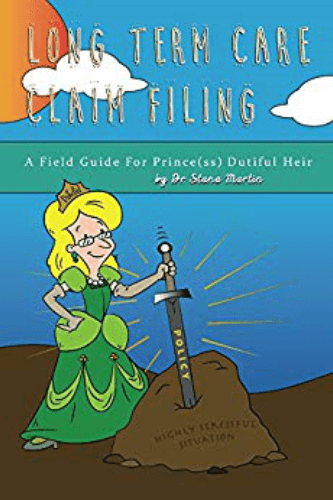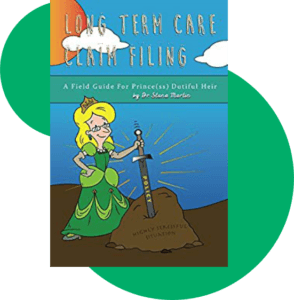Mrs. LTC is here to help you through the confusion and uncertainty that often comes with claim and payments.
SEE CLAIM SERVICES
Long Term Care Claim Questions & Answers
How do I go about filing a Long Term Care Claim?
The trick with long term care claims is twofold:
1 Know the policy well enough to be certain you are providing right information to the insurance company so you don’t get a denial.
AND
2 Manage the document-intensive process so no wrong or incomplete documents go to the insurance company.
Will a claim be paid if you don’t do either of those things?
Yes. No. Maybe.
Claims get approved every month where people are “winging it”. But since that can also cause you to have a decline unnecessarily, it is far better to understand how the claim process works, what the contract triggers are, and how to make that work in your favor.
A well executed strategy will beat “winging it” every time – guaranteed.
Top 10 Claim Questions & Answers
Question #1
My claim has been denied. Can you fix this?
Answer: Probably. It depends on why you were denied.
See Our Blog Article - Denied Claim? There is still hope…
for the reasons claims are denied and common fixes.
Question #2
Will my policy pay for - Home Care? Assisted Living? Memory Care? or a Nursing Home?
Answer: The reason we can’t answer that with an absolute “yes” or “no” is because it depends on answers to a couple of questions.
To see more on this answer Our Blog Article - Will my Policy pay for my care?
Question #3
Am I claim eligible today?
Answer: You have two main hurdles to clear to be claim eligible: you must have a care provider that is approved in the contract, and you must meet the medical need for care as outlined in the contract.
See Our Blog Article - Will my Policy pay for my care?
for more details.
Question #4
How much will my policy pay for care?
Answer: There will be a page called the “Schedule of Benefits” page or something similar. It will be formatted in two columns where the left side has a label and the right a value. To know how much your policy paid for care WHEN YOU BOUGHT IT, find the label on the page that says “Daily Benefit” amount, “Weekly benefit” or “Monthly benefit”. This will tell you how much the policy was able to pay for care when you first bought the contract. It may still be that same amount…or it may be worth more today. If you bought some inflation guard (3% compound or 5% simple or…there are lots of possibilities here), and/or if you had a purchase offer that you took advantage of at least once since you bought the policy, the policy is worth more today than it was when you bought it.
However, I caution you that you can’t take this at face value. Too often policy holders did something in the ensuing years (say dropped the inflation rider) and have forgotten they did that. So it is always safest to call the insurance company and get an updated schedule of benefits from them.
Point of warning: the insurance company will not tell a third party anything about this contract as it is all HIPAA protected information. You must have the policy holder on the phone to give permission for disclosure OR you must have a copy of the durable power of attorney document on file with the insurance company and have the designated DPOA on the phone.
Question #5
How long will my policy pay for my care?
Answer: A few policies will say either “unlimited” or “lifetime” on the benefit amount. This means the policy will pay until the person goes off claim or passes away.
Most policies, however, will indicate either a time limit (say in years or months) or a total pool of money. If you are given the total pool of money, you can estimate the time window the policy will last by doing math: divide the total pool of money by the amount it pays per day/week/month. For instance, if the original pool of money was $108,000 and the monthly amount was $3000, then 108K/3K=36 months or 3 years.
Question #6
Is there a deductible?
Answer: Yes. It is insurance. Insurance has deductibles. The deductible (also called wait window or elimination period) is a set number of days that the policy holder must pay the full cost of care out of pocket before the policy will kick in to pay benefit. We have seen these at 0 days, 30, 45, 60, 90, 100, 180, and 365. Your schedule of benefits will tell you what the number of days are for your policy.
You should find out if these are calendar days or service days as this can make a big difference, especially when home care is not used every day.
Question #7
Why did my policy stop paying after it was approved?
Answer: Well…this could be a couple of different things. But the most likely is that you didn’t send any more invoices in and/or in home care you sent invoices but no daily visitation notes. All claims require that an invoice for services rendered go to the insurance company. So if you sent everything in you needed up front and got approval, but then you stopped sending in invoices….well, the claim stopped paying.
Or, if you were doing fine in home care and then shifted to assisted living or some other type of care, there is a whole set of different documents that must go in to shift the claim to the new care provider. This is worth calling the insurance company and asking what the hold up is.
Chances are the rep on the phone will be able to tell you the last date of service for which they have invoices and you can then back up and get all the paperwork to the carrier to get the claim paying again.
Question #8
My friend’s policy paid for her daughter to care for her. Will mine do that?
Answer: Maybe. If your policy allows for family or informal care givers and/or if your policy pays cash/indemnity for care, then your policy will pay for a daughter or someone else who is not licensed to be your care giver. An experience agent can read your contract to answer that.
Or you can call the insurance company and ask the rep who answers the phone. The challenge with the latter is you may get a well trained person….or a new person. And that can seriously skew the answer you get.
Question #9
What happens if I run out of benefits?
Answer: This depends on many things…
~ if you had a state partnership qualified policy, then you probably have some asset protection from the usual “spend down” provision. You may be able to qualify for Medicaid assistance without spending too much of your own money. Your policy will have a statement in it (usually a one or two-page statement) telling you it is qualified for the state program, if it is. When in doubt, however, call your Insurance Commissioner. Someone there should be able to help answer this for you and you can learn about how the program works.
~ if you did not have a state partnership qualified policy, then you are back to paying out of your own pocket fully for care. I always recommend that – if it looks like you are likely to run out of benefits before you run out of life – get help from an Elder Law Attorney in your area. This is an attorney who specializes in estate planning with the express purpose of preserving as much of the estate as possible while also managing care costs. They are able to answer knowledgeable about Medicaid, Veteran’s benefits, etc. You can find an attorney of this type at www.naela.org .
Question #10
What if I start in home care and have to move to assisted living facility (ALF)?
Answer: So long as your policy still has benefits and so long as the contract will pay for the new type of care giver (in this instance, the ALF), the claim will port with you. It will require a new round of documents from your new care giver, but it should continue to pay in the new environment.
NOW…if you have run out of benefits OR if the new care giver is not approved on the contract, the policy will not pay. So you need to know if the policy will pay for that type of care giver and how much is left in the policy before you make a switch.






